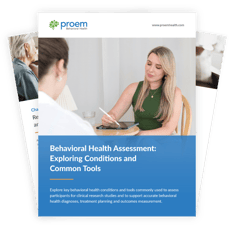Behavioral Health Assessment: Exploring Conditions and Common Tools
We examine OCD, BDD, and assessment tools that help gather accurate information in support of better care, outcomes and research.

Even the most knowledgeable behavioral health professional still needs assistance in assessing the specific conditions and symptoms their patients face, whether it’s the severity of the symptoms in the individual or how the condition impacts their life. Subjective interpretations and the nuances of individual disorders make understanding and treating patients difficult and complex, while in clinical research, study participants must be assessed for inclusion or exclusion, so the study stays on time and on budget.
In the eBook Behavioral Health Assessment: Exploring Conditions and Common Tools, we outline some of the most commonly-used clinical interviews, scales, and screening assessments used in behavioral health practices and research settings. We also do a deep dive into two often-misunderstood conditions, sharing how they manifest in children, adolescents and adults, the effect they have on those individuals and the ways in which they differ from similar disorders.
The guide further shares historical information on how some of these tools have evolved over the years and how the insights they produce can be used to inform more targeted and effective treatment planning and more accurate research results.
Tools and conditions covered include:
-
The Mini International Neuropsychiatric Interview (M.I.N.I.)
-
The Sheehan Disability Scale® (SDS)
-
Obsessive Compulsive Disorder (OCD)
-
YBOCS-II and FOCI for OCD
-
Body Dysmorphic Disorder (BDD)
-
Body Dysmorphic Disorder Questionnaire (BDDQ)
-
BDD Diagnostic Module
-
Several other clinical interviews and scales for BDD
Download our e-book to demystify two of the more complicated behavioral health conditions and choose which aids are right for properly evaluating patients and study participants experiencing them.





.png)